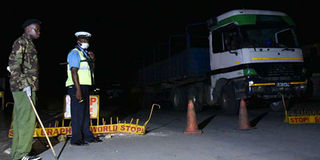Laws to fight Covid-19 are necessary but not all are constitutional

Police put up a roadblock at Mtwapa Bridge in Kilifi County to detain those violating nationwide curfew, on March 27, 2020. PHOTO | KEVIN ODIT | NATION MEDIA GROUP
What you need to know:
- Defiance of the directives would constitute criminal offences, for which there would be a fine and or imprisonment on conviction.
- The Public Health Act of Kenya retains the colonial attitude of power and control, with a public order bent rather than a health management one.
The fear of the Covid-19 pandemic and its potential spread, with the risk that the fatalities seen so far all over world could increase, has led to most countries and governments taking various administrative and legal actions to contain it.
For instance, Kenyans now have to contend with a curfew that restricts movement other than for designated essential service providers such as police and healthcare workers between the 7pm and 5am.
Many feel – and I share the view – that the pestilential challenge of Covid-19 might justify the limitation of civil liberties in the short term.
Kenya is not an outlier in this regard. South Africa has instituted a virtual no-movement lockdown for at least 21 days under the “State of Disaster Regulations”.
These Regulations empower the Minister of Police to issue directions to address the prevention of the spread of Covid-19 infections among people working in police stations or those within the cells.
Under these regulations, citizens are supposed to be confined to their homes for the entire period.
The only permitted exceptions are errands for the purchase of food, seeking healthcare or for collection of welfare cheques.
To ensure compliance, the South African government has appointed “spotters” or spies to look out and inform the authorities where this law is disobeyed.
SOCIAL DISTANCING
But some of the measures proposed in the regulations are contentious and border on human rights violations.
The law permits the National Institute of Communicable Diseases to get information from the mobile phone operators on the whereabouts of subscribers to help them monitor areas that may be at the risk of the Covid-19 spread.
In the United Kingdom, the Coronavirus Bill passed by the parliament last week empowers the police, public health and immigration officials to direct a suspected Covid-19 carrier to a screening centre, with powers to confine them if they decline.
The law also gives powers to the officials to restrict events and gatherings in premises.
In France, the Covid-19 legislation bans any meetings or indoor gatherings of more than 500 people.
While social distancing is taken further in France, but only with recommendation that the favourite French custom, la blise, that is the greetings of a person by kisses on the cheeks, be avoided for the time being.
In Kenya, under the Public Health Act, the Cabinet Secretary in charge of health services has fairly wide powers with regard to containing infectious diseases.
COLONIAL ATTITUDE
He may direct any person suffering from an infectious disease to be taken for testing and confined in a hospital or designated healthcare centre for treatment.
The CS may also prohibit persons from visiting each other in their private homes.
Defiance of these directives would constitute criminal offences, for which there would be a fine and or imprisonment on conviction.
This law also allows the minister to prohibit the entry into Kenya of a ship or any vessel during a pandemic, unless the persons therein are quarantined to avoid the importation of infections.
The truth is that some of these laws have a draconian core. The Public Health Act of Kenya, being the law that is being applied on the frontline of containing the Covid-19 pandemic, was first enacted in 1921.
Though it has been amended several times since, it retains the colonial attitude of power and control, with a public order bent rather than a health management one.
In India, the law that the states have used to draw regulations that are applied to contain the spread of Covid-19 is over a century old: The Indian Epidemic Diseases Act was first enacted in 1897 by the British colonial government with the intention of containing the spread of the Bubonic Plague in the state of Bombay, today’s Mumbai.
PERSONAL LIBERTIES
When you see persons being charged with spreading falsehoods about an epidemic in Kenya today, it is to this law you may trace thinking behind such censorship.
These regulations and measures come at a great cost to the public in terms of personal liberties, but are generally acceptable on the ground: that there is far greater danger to the individual and society if the infectious disease was to spread.
That is why breach or failure to comply would attract serious criminal penalty.
However, some of the criminal dimensions of these regulations must be enforced with care because many populations may stand them only for a given, short period.
If implemented with abandon, then the point of inflection may be reached fairly quickly then the people begin to resist the risk of enslavement in the yearning to regain their liberties.
The writer is head of legal, Nation Media Group PLC




